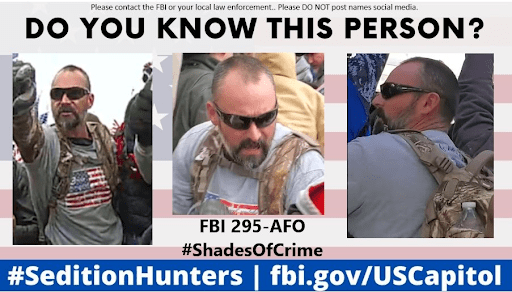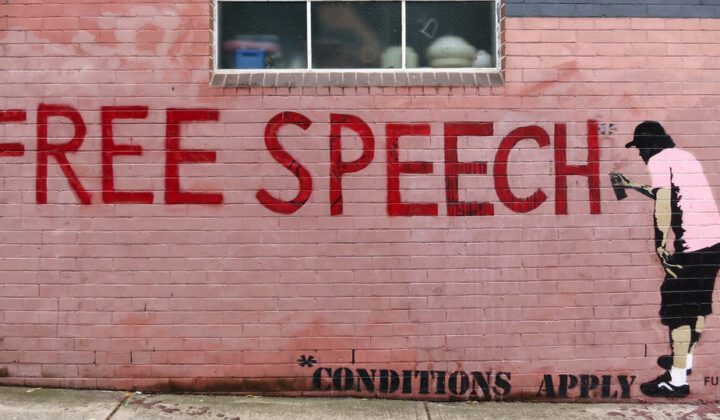Robert Reeder, a Maryland man, was due for sentencing last week after he pleaded guilty to “parading, demonstrating or picketing in a Capitol building”in the January 6th Capitol Riot. Federal prosecutors recommended he spend two months in jail for his role in the riot.
Then, just hours before Reeder was to arrive in court, a Twitter account posted a video of him assaulting a police officer. Before, the prosecutors had no evidence that he had done anything violent. Now they had him on video. The judge postponed the hearing, and federal prosecutors started seeking six months of jail-time. Reeder’s new sentencing hearing is scheduled for October 8.
The Twitter account which posted the evidence of Reeder’s assault is called Sedition Hunters. The group’s stated purpose is “to assist the U.S. FBI and Washington D.C. Capitol Police to find those who committed crimes on January 6 at the Capitol.” It’s the most important of a few communities of “virtual vigilantes” seeking to identify the participants, and has already aided in numerous investigations. But as the Sedition Hunters help hold people accountable, their actions also open questions about the boundaries of vigilante justice and privacy.
How have the Sedition Hunters aided the FBI?
The Sedition Hunters describe themselves as “a global community of open-source intelligence investigators (OSINT).” The “open-source” portion of their description means that they’re only looking at information that’s readily available for anyone to find on the internet. During the riot, many of the participants filmed themselves and one another committing crimes and posted the videos for all the world to see. Despite their best efforts to cover their tracks since then, groups like Sedition Hunters are making sure no one looks away.
Sedition Hunters piece together the events of January 6th through the thousands of hours of video and hundreds of pictures they were able to scrape from social media. They then painstakingly study every angle, image, and freeze frame to build profiles on the participants––something the FBI is doing as well, but with limited time, resources, and manpower.
If they believe that they’ve positively identified an individual, they’ll contact the FBI directly. If they have quality photos of an individual but can’t determine their identity, they’ll post the person’s photos to Twitter as a social-media-age wanted poster of sorts, imploring anyone who recognizes the person to reach out to the FBI.
Are the Sedition Hunters’ tactics a threat to free societies?
The Sedition Hunters stand firmly on the side of protecting democracy by trying to prevent the rioters from escaping the law. Still, that a group of online vigilantes have so much power––in some cases beyond the abilities of the FBI––should raise eyebrows.
The Sedition Hunters’ analysis of social media posts is fairly anodyne. Where the Sedition Hunters go further is in using PimEyes, a controversial facial recognition software. Individuals upload a photograph of someone’s face to the service, then PimEyes analyzes it and compares it against a database with almost one billion photographs. (Enter a photo of yourself here if you’re curious what they’ve collected on you, but we can almost guarantee that you won’t like what you find.)
Anyone can appear in the database, as the images have been pulled from the internet without the original poster’s knowledge. In seconds, PimEyes can turn any internet user into an FBI agent running sophisticated facial recognition software, and privacy protections are all but nonexistent. Users can even set up alerts so that they can be notified whenever a new photograph of a particular person is posted on the internet.
The technology is highly controversial, and rightfully so. A similar company, Clearview AI, scraped more than 3 billion photos and videos from the internet by 2019 and created their own facial recognition database. Marketing to law enforcement, they sold their product to more than 600 agencies in America. Clearly, they had created something extremely powerful, yet at no point did they face scrutiny from regulators or have to worry about privacy protections. There is nothing preventing a company from downloading every photograph or video of a person’s face on the internet, creating a private database, powering it with advanced facial recognition technology, and releasing it to the world. Every time someone posts a photo to Facebook, they’re unwittingly building out their facial recognition profile.
Are the Sedition Hunters heroes or criminals?
PimEyes eases the Sedition Hunters’ work, but it may complicate their legacy. Openly-accessible facial recognition technology is aiding law enforcement in this instance, but it could threaten any semblance of privacy in years to come. An early investor in Clearview told the New York Times “I’ve come to the conclusion that because information constantly increases, there’s never going to be privacy… Laws have to determine what’s legal, but you can’t ban technology. Sure, that might lead to a dystopian future or something, but you can’t ban it.”
Maybe you can’t ban it, but you can absolutely regulate it. In Europe, the ??General Data Protection Regulation (GDPR) established sweeping guidelines on how data can be handled, and promised significantly greater oversight. The United States should consider its own comprehensive data regulations to establish clear limitations on how private citizens and public entities can use personal data.
If an American wants their personal photographs and likeness to be removed from publicly-accessible facial recognition services, it should be their right. While law enforcement agencies should certainly be granted more privileges to retain major databases, even they should face scrutiny for potential abuses. Data protections are severely lacking, and we won’t like where we find ourselves in a few years if we don’t work proactively to protect personal privacy.
At the moment, the Sedition Hunters are doing the federal government a great service, and they should be celebrated for their efforts and resourcefulness. Yet their tactics should serve as a warning: online facial recognition software is turning everyday Americans into capable FBI agents, and there is nothing to prevent them from abusing that power.





